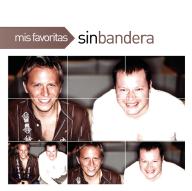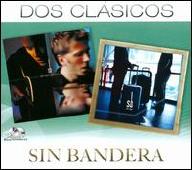They debuted with the song "Entra en Mi Vida," an expressive love song that was chosen to be the main theme of a Mexican telenovela, #Cuando Seas Mía. Other singles followed, including "Kilómetros" and "Sirena." Released in early 2002, Sin Bandera steadily found international success, mainly in Mexico but also in Spain, Argentina, and the United States -- that is, all the major Latin markets -- in addition to smaller markets like Costa Rica. The album won that year's Latin Grammy for Best Pop Album by a Duo or Group with Vocal, and it also netted a standard Grammy nomination for Best Latin Pop Album. Other awards showered on the duo included an MTV Latino Award for Best Group and a Lo Nuestro Award for Best Pop Album.
Following this rash of breakout success, Sin Bandera returned to the studio quickly and recorded a follow-up album, De Viaje (2003), with Baqueiro again producing and playing a multitude of instruments. De Viaje sold even better than Sin Bandera had, and it featured the duo's first Hot Latin Tracks chart-topper, "Mientes Tan Bien." Other singles include "Que Lloro," a Top Five hit, and "De Viaje," which broke into the Top 20. This second round of success was topped off with another Latin Grammy win for Best Pop Album by a Duo or Group with Vocal. Also in 2003, Sin Bandera toured America and Spain in support of Spanish superstar Alejandro Sanz, who was on the road promoting No Es Lo Mismo (2003), another of the biggest Latin pop albums of the year. In 2004, they mounted a tour of their own, covering all of Latin America, even small markets like Bolivia and Paraguay.
For their third album, Mañana (2005), García and Schajiris reached beyond Baqueiro, reeling in such collaborators as contemporary R&B producer Brian McKnight, arranger Bill Meyers, Latin rapper Vico C, and Italian pop superstar Laura Pausini. The result was their most stylistically diverse album yet, certainly their most urban -- not unlike No Es Lo Mismo in this regard, as that album had found Sanz toughening up his sound with urban flourishes. Mañana became their first album to break into the Billboard 200; it was also their first to break into the Top Five of the Top Latin Albums chart. "Suelta Mi Mano" was the biggest hit among the singles, with "Que Me Alcance la Vida" also charting well. Pasado (2006) followed soon afterward. An album of covers, Pasado showcases Sin Bandera reinterpreting songs by such well-known contemporary Latin pop influences as Sanz ("Lo Ves"), Ricardo Montaner ("Será"), Aleks Syntek ("Mis Impulsos Sobre Ti"), and Rosana ("Si Tu No Estas Aquí").
After a lengthy tour of Latin America, Sin Bandera decided to split in 2007 though it was amicable. Both singers followed different solo paths, recording and writing separately. A second covers collection, Pasado Mañana was issued digitally in 2009 and the collection Personalidad in 2014. In mid-2015, Sin Bandera announced a reunion and undertook a tour they called Una Ultima Vez. It began in December and lasted well into 2016 with almost all shows sold out. To integrate the repertoire of the presentations, Garica and Schajiris asked their fans to send them a Top 10 list of songs that they'd like to hear. Response was overwhelming. Hundreds of lists were received and a set list was chosen (partially) based on them. The live Una Última Vez EP, released in 2016 as the tour progressed, topped the Latin albums chart; they followed it early the next year with Primera Fila Acustico: Una Ultima Vez - Encore, issued in 2017. The recording placed at number three on the Latin Pop Albums chart. ~ Jason Birchmeier, Rovi


















